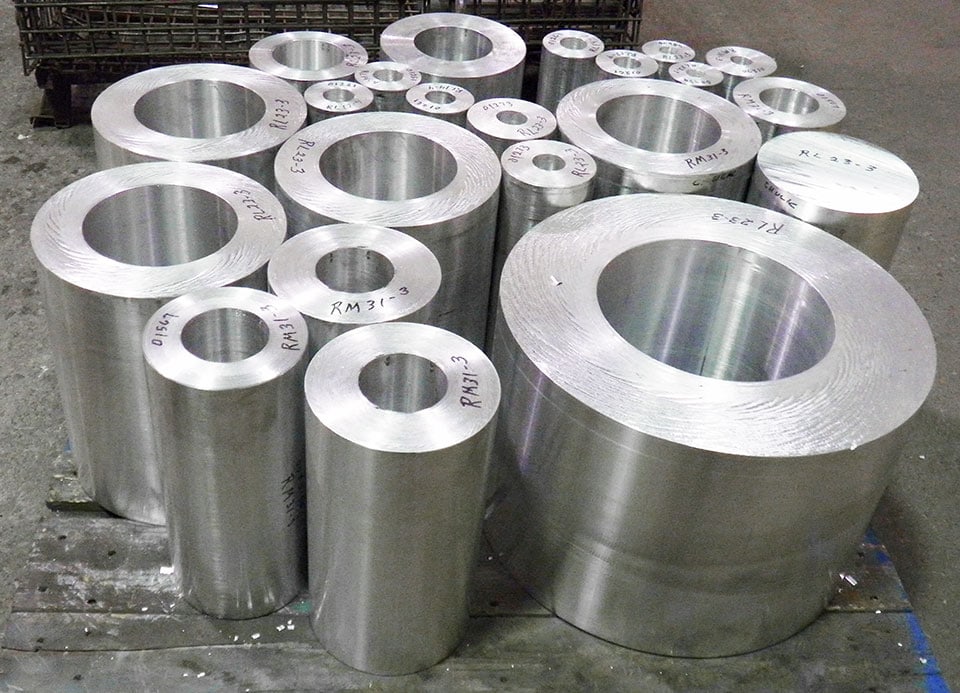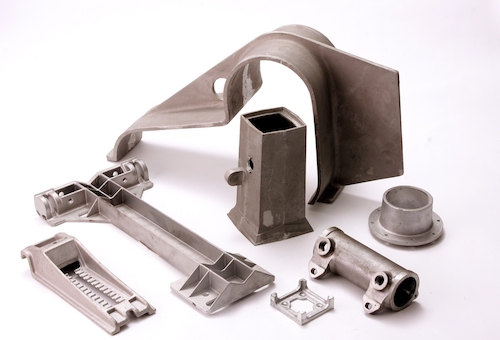The commitment of Wisconsin Aluminum Foundry to excellence
Wiki Article
Checking Out the Versatile Makes Use Of and Applications of Aluminum Castings in Modern Industries
Aluminum spreadings have actually ended up being indispensable to different contemporary sectors because of their special residential or commercial properties. They supply significant benefits in weight reduction, thermal conductivity, and rust resistance. From automobile advancements to applications in durable goods and building, their convenience is remarkable. The real extent of their effect expands beyond prompt advantages, hinting at broader implications for sustainability and effectiveness. What exists in advance for aluminum spreadings in an ever-evolving commercial landscape?Automotive Industry Innovations
The automobile industry has actually significantly accepted aluminum castings to enhance lorry performance and effectiveness. By utilizing light weight aluminum, manufacturers can generate lighter components, which contribute to enhanced fuel economic climate and decreased discharges. Secret applications include engine blocks, transmission instances, and structural parts, where the material's strength-to-weight ratio supplies toughness without adding excess weight.Aluminum castings additionally supply remarkable thermal conductivity, which assists in far better heat dissipation, therefore improving engine efficiency. Additionally, improvements in casting modern technologies, such as die casting and sand casting, make it possible for the manufacturing of intricate geometries, enabling for ingenious layouts that enhance area and functionality.
The recyclability of aluminum lines up with sustainability objectives in the auto sector, promoting eco-friendly practices. As the sector continues to innovate, making use of light weight aluminum spreadings is most likely to broaden, driving more innovations in lorry layout and efficiency.
Aerospace Innovations and applications
While the aerospace sector proceeds to focus on weight decrease and gas efficiency, light weight aluminum castings have become an important material choice for different applications. Their light-weight nature, paired with high strength-to-weight ratios, enables for considerable enhancements in aircraft performance and efficiency. Aluminum spreadings are typically utilized in structural parts, such as fuselage structures and wing components, where lowering weight is essential.Current improvements in light weight aluminum casting technologies, including boosted alloy solutions and accuracy spreading techniques, have even more boosted the product's performance capabilities. These advancements make it possible for the production of complicated geometries and detailed layouts while preserving architectural stability. Furthermore, aluminum's superb deterioration resistance assurances longevity and integrity in extreme aerospace settings.
As the aerospace market significantly embraces sustainability, light weight aluminum castings use a recyclable service that lines up with green techniques, making them an essential element in the development of next-generation aircraft.
Durable Goods and Everyday Products
As customers increasingly seek lightweight yet durable materials for daily products, aluminum castings have actually obtained popularity in various consumer items. The one-of-a-kind buildings of aluminum, including its resistance to deterioration and exceptional thermal conductivity, make it a perfect option for products like cookware, family devices, and outdoor gear. Aluminum cast pots and pans supply even warm distribution, boosting cooking effectiveness. Furthermore, using aluminum in things such as bicycle structures and baggage ensures an equilibrium in between stamina and mobility. Makers value aluminum castings for their adaptability, as they can be easily molded right into complicated forms while keeping architectural integrity. The ability to reuse aluminum without deteriorating its buildings straightens with expanding consumer choices for lasting products. Overall, aluminum castings are essential to the manufacturing of durable, useful, and cosmetically pleasing durable goods, meeting the demands of modern way of livings.Construction and Architectural Makes Use Of
Light weight aluminum castings have come to be an important element in building and construction and architectural layout, especially due to their strength and lightweight nature. These residential or commercial properties make light weight aluminum a suitable choice for various applications, including architectural components, facades, and decorative functions - Metal Castings. Contractors and architects significantly make use of light weight aluminum castings for home window frames, doors, and roof systems, boosting both performance and looks. The product's resistance to corrosion additionally extends its life expectancy, decreasing maintenance expenses and making certain sturdiness in diverse environmental problemsLight weight aluminum can be quickly built into detailed designs, allowing for cutting-edge architectural expressions. Its convenience promotes the production of personalized pieces that satisfy certain style demands, from luxuriant barriers to complex supports. As sustainability becomes a concern, aluminum's recyclability includes in its charm in environment-friendly building techniques. Generally, light weight aluminum spreadings are transforming the building and construction industry by offering light-weight, resilient, and visually appealing services.
Electric and Digital Components
Light weight aluminum spreadings play a vital duty in the manufacturing of light-weight electrical units, which enhance portability and efficiency in numerous applications. Additionally, their excellent thermal conductivity makes them suitable for warmth sinks, making certain peak performance and longevity of electronic components. Moreover, light weight aluminum's conductive residential properties add to its use in different electric conductors, stressing its significance in modern technology.Light-weight Electrical Rooms
Light-weight electrical rooms play an important duty in safeguarding sensitive electronic elements from environmental aspects and physical damage. Constructed from light weight aluminum spreadings, these units are valued for their strength-to-weight proportion, making them ideal for numerous applications throughout sectors. Their light-weight nature aids in reducing total system weight, which is important in portable and mobile electronics. Moreover, light weight aluminum's corrosion resistance improves longevity, prolonging the life expectancy of the encased components. The capacity to mold aluminum into complicated forms allows for customized layouts, catering to details requirements while making sure reliable warm dissipation. In addition, these units can be conveniently integrated right into existing systems, offering versatility and flexibility in modern technical settings. On the whole, lightweight light weight aluminum units substantially add to the performance of electronic tools.Heat Sinks and Conductors
While numerous products are made use of in electronic parts, light weight aluminum castings stand out for their performance in warm monitoring as warmth sinks and conductors. Their excellent thermal conductivity permits for reliable heat dissipation, which is important in protecting against the overheating of digital tools. Light weight aluminum's lightweight nature additionally boosts its suitability for applications where weight is a significant factor, such as in aerospace and auto industries. Furthermore, light weight aluminum castings can be easily built into complicated forms, giving layout adaptability for maximizing thermal efficiency. The corrosion resistance of light weight aluminum also adds to the long life and integrity of these elements in different environments. As modern technology advances and devices come to be much more compact, the demand for effective warm administration solutions, like aluminum spreadings, remains to expand.Marine Industry Application
The marine market significantly relies upon light weight aluminum castings for their exceptional toughness and rust resistance. These homes make aluminum an ideal choice for numerous applications, including watercraft hulls, engine components, and aquatic equipment. The light-weight nature of aluminum castings enables boosted fuel efficiency and less complicated maneuverability in watercraft, which is vital for both entertainment and business vessels.
Aluminum castings also provide considerable expense benefits as a result of their lengthy lifespan and reduced maintenance requirements, decreasing the general functional expenditures for marine operators. Additionally, the adaptability of light weight aluminum permits complex styles that can fulfill particular efficiency needs.
Makers in the marine market utilize innovative spreading techniques to create complicated forms, guaranteeing that components meet extensive safety and performance requirements. As the need for high-performance aquatic vessels grows, aluminum castings are positioned as an essential material in boosting the performance and long life of aquatic devices.
Sustainability and Recycling in Light Weight Aluminum Casting

Aluminum Recycling Process
Recycling light weight aluminum plays a crucial role in lessening environmental impact and conserving sources within the casting industry. The aluminum reusing procedure begins with the collection of scrap light weight aluminum, which can include old elements, making waste, and post-consumer products. This scrap is after that arranged, cleaned up, and shredded right into little items to help with melting.When prepared, the light weight aluminum scrap is melted in a heating system at lower temperature levels than key light weight aluminum manufacturing, greatly decreasing power consumption. The molten light weight aluminum is then cast into ingots or other shapes for reuse in numerous applications - Metal Castings. This closed-loop system enables the effective recuperation of light weight aluminum, protecting its properties while reducing the need for virgin products. Consequently, the recycling process is an important part of sustainable techniques in aluminum spreading
Ecological Benefits
While aluminum spreading plays a crucial function in various industries, its ecological advantages are especially exceptional relating to sustainability and resource conservation. The lightweight nature of aluminum adds to power effectiveness in transportation, decreasing fuel usage and emissions. Furthermore, aluminum spreading helps with using recycled materials, significantly lowering the energy required for manufacturing compared to primary light weight aluminum. This reusing procedure lessens waste and reduces the ecological influence connected with mining and refining basic materials. Aluminum is 100% recyclable without degradation of its homes, promoting a lasting lifecycle. By choosing aluminum casting, industries can significantly minimize their carbon impact while promoting source effectiveness, making it a vital choice in the quest of ecologically friendly manufacturing techniques.Closed-Loop Equipments

Regularly Asked Questions
What Are the Trick Advantages of Light Weight Aluminum Castings Over Other Products?
Aluminum spreadings provide light-weight properties, superb corrosion resistance, and high strength-to-weight proportions. They can be easily formed right into complex shapes, give great thermal and electric conductivity, and are affordable, making them preferable over lots of different materials.Exactly how Is the Light Weight Aluminum Spreading Process Eco-friendly?
The aluminum casting procedure is eco-friendly due to its recyclability, reduced power intake, and reduced waste manufacturing. Its ability to utilize recycled materials lessens the carbon impact, advertising sustainability within manufacturing practices.What Are Typical Obstacles in Light Weight Aluminum Spreading Manufacturing?
Typical obstacles in light weight aluminum spreading manufacturing consist of maintaining dimensional accuracy, managing thermal contraction, stopping issues like porosity and additions, making certain proper mold and mildew design, and optimizing manufacturing efficiency while minimizing material waste and environmental influence.Just How Do Light Weight Aluminum Castings Compare in Expense With Other Manufacturing Methods?
Aluminum castings normally use competitive expenses compared to other manufacturing approaches, specifically for tool to high-volume production. Their lower first tooling costs and reliable material use can result in favorable economics over time.What Future Trends Are Anticipated in Light Weight Aluminum Casting Technology?
Future fads in light weight aluminum casting modern technology are prepared for to include developments in automation, enhanced alloy structures, enhanced reusing techniques, and the integration of 3D printing, all targeted at enhancing efficiency, lowering expenses, and minimizing ecological impact.Recent advancements in light weight aluminum casting modern technologies, consisting of improved alloy formulas and precision spreading techniques, have actually further improved the material's efficiency capabilities. Light weight aluminum castings have actually become a crucial element in construction and building layout, especially due to their toughness and lightweight nature. The aluminum recycling procedure begins with the collection of scrap aluminum, which can consist of old components, producing waste, and post-consumer items. Once prepared, the aluminum scrap is melted in a heater at lower temperatures than main light weight aluminum production, considerably reducing energy usage. In addition, light weight aluminum casting facilitates the use of recycled materials, substantially lowering the energy required for production contrasted to key light weight aluminum.
Report this wiki page